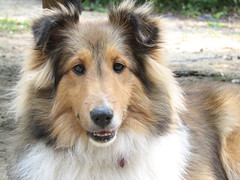Questions to ask your vet when your animal companion has cancer
 Cancer can be overwhelming. Often times the diagnosis comes suddenly and there is almost always an element of shock with it. The little lump that you were convinced was just a wart could be life threatening. The mild weakness was just discovered to be a belly full of tumors.
Cancer can be overwhelming. Often times the diagnosis comes suddenly and there is almost always an element of shock with it. The little lump that you were convinced was just a wart could be life threatening. The mild weakness was just discovered to be a belly full of tumors.
It can be hard to ask all the right questions especially when you are having strong emotions. So what do you need to ask and know before deciding on the best course of action to take for your animal companion?
One of the most important questions
- What happens if we do nothing? It is easy to get so convinced that we need to treat that we forgot to ask with will happen if we don’t . In older animals with slow moving cancers, it is sometimes better to just treat supportively than to jump into aggressive treatments.
Comfort
- What can we do right now to make my animal more comfortable? Another very important question. With cancer, comfort is very important. Even if your animal has very little time left here, it should be as happy and pain free as possible.
- Is there drugs that can slow this cancer down without doing more aggressive treatments like chemo/radiation or surgery? Prednisone is often a good drug for this. This is also where herbals and acupuncture can come in.
- Is there drugs that can help my animal eat better? Many animals with cancer are picky eaters. Sometimes appetite stimulants or anti-nausea drugs are helpful.
- Do you know a good holistic vet I can work with?
Surgery
- Is there a surgical option for this cancer? Usually cancers that are isolated to one area are treated with surgery. If a cancer has already spread, or is a blood born or lymphatic system cancer, surgery is usually not an option.
- If there is, what is the prognosis that my animal will make it through the surgery? Some surgeries are relatively easy and some can be very difficult.
- Do you recommend I see a surgeon? More difficult surgeries are best done by the experts, unless you are working with a vet who is very skilled at surgery.
- If we can remove the whole tumor, what are the chances that it has already spread or will come back? What is the prognosis for after surgery? i.e. is there a reason to do the surgery? Will it give my animal a better and longer life?
- Do you think my animals’ health is such that surgery is a good option? If not why? If you animal is very old, sick or has serious chronic disease, surgery may not be a good option, even if it is the best way to beat the cancer. Remember we are treating the animal not the cancer.
- What kind of care will my animal need after surgery? Will there be long term complications or disability? This is especially important if you work full time or have a household of small children or if you have a dog you can not carry.
Chemotherapy and Radiation
- Do you have experience doing chemotherapy? If the answer is no or a little consider seeing an oncologist at least for a second option.
- Can you refer me to a good oncologist? Oncologists often have new treatment options that general practitioners don’t use.
- What is the prognosis with this treatment? This is an important question. Is $4000 of chemo going to give you a good chance of getting a year or more, or only buy a month extra and come with side effects.
- How long will my animal have to undergo treatment? How often? Is there an option to do part of a protocol and still get results? For animals with a lot of anxiety going to the vet, this can be an important consideration
- How much will it cost?
- Will my animal need to be sedated or anesthetized for the procedure? With radiation the answer is always yes, sometimes this is also necessary with chemotherapy.
- Is there a chance at permanent remission?
- What are the side effects? Does prognosis out weight the chance of serious side effects.
- Do you have a plan to treat the side effects if they occur? Many oncologists use drugs to treat the side effects of these treatments.
- Are you ok with me working with a holistic vet or with supplements/herbs? It is always easier to work with these therapies if you can be honest with your vet.
- What kind of risk to me or other humans/animals in the household is there with this treatment? This can be extremely important if there are pregnant women or small children in the household.
End of Life
-
- Have you had experience doing hospice care? Is there someone in the community who does hospice care?
- Is there a good support group in the area or online?
- When the end comes will you come to the house to perform euthanasia? Is there a house call vet who will?
- What do I do if there is an emergency in the middle of the night, on the weekend or after office hours?
Do not be afraid to ask –
the question I often get. Most of us are animal lovers, we have seen a lot of animals go through treatments and often times have personal experience with our own animals.
If this was your dog/cat/rabbit what would you do?
I hope this is helpful. Please let me know if I have missed any important questions.

